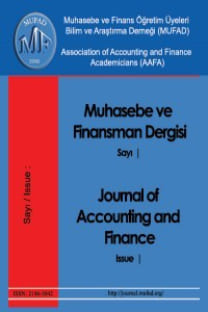Kurumsal Sürdürülebilirlik ve Finansmana Erişim: BİST’de Bir Uygulama
Sürdürülebilirlik, Kurumsal sürdürülebilirlik, Finansmana erişim, Çevresel, sosyal ve kurumsal yönetim
Corporate sustainability and access to finance: An application in BIST
Sustainability Corporate sustainability, Access to finance, Environmental, social, and corporate governance,
___
- Aras, Güler - Crowther, David (2008), “Governance and Sustainability: An Investigation into the Relationship Between Corporate Governance and Corporate Sustainability”, Management Decision, 46(3), pp. 433-448.
- Aras, Guler - Tezcan, Nuray - Furtuna, Ozlem Kutlu (2018), “Multidimensional Comprehensive Corporate Sustainability Performance Evaluation Model: Evidence from an Emerging Market Banking Sector”, Journal of Cleaner Production, 185(2018), pp. 600-609.
- Ateş, Sinem (2021), “Kurumsal Sosyal Performansın Borçlanma Maliyetlerine Etkisi”, Muhasebe ve Denetime Bakış, 62, ss. 191-206.
- Atif, Muhammad - Ali, Searat (2021), “Environmental, Social and Governance Disclosure and Default Risk”, Business Strategy and the Environment, 30(8), pp. 3937-3959 . Bhuiyan, Md Borhan Uddin – Nguyen, Thi Hong Nhung (2019), “Impact of CSR on Cost of Debt and Cost of Capital: Australian Evidence”, Social Responsibility Journal, 16(3), pp. 419-430.
- Bolin, Mattias – Rana, Omar Shahzad (2021), “What is the Relationship Between ESG Performance and Financial Constraints? Evidence from Europe”, Master's thesis, BI Norwegian Business School, Norway.
- Cheng, Beiting - Ioannou, Ioannis – Serafeim, George (2014), “Corporate Social Responsibility and Access to Finance”, Strategic Management Journal, 35(1), pp. 1-23.
- Cho, Seong Y. - Lee, Cheol – Pfeiffer, Ray J. Jr. (2013), “Corporate Social Responsibility Performance and Information Asymmetry”, Journal of Accounting and Public Policy, 32, pp. 71-83.
- Dhaliwal, Dan - Li, Oliver Zhen - Tsang, Albert - Yang, Yong George (2014), “Corporate Social Responsibility Disclosure and the Cost of Equity Capital: The Roles of Stakeholder Orientation and Financial Transparency”, Journal of accounting and Public Policy, 33(4), pp. 328-355.
- Diamond, Douglas W. – Verrecchia, Robert E. (1991), "Disclosure, Liquidity, and the Cost of Capital" The Journal of Finance, 46(4), pp. 1325-1359.
- Do, Trung K. (2022), “Corporate Social Responsibility and Default Risk: International Evidence”, Finance Research Letters, 44, pp. 102063.
- Düzer, Murat - Önce, Saime (2018), “Sürdürülebilirlik Performans Göstergelerine İlişkin Açıklamaların Finansal Performans Üzerine Etkisi: Bist’te Bir Uygulama”, Muhasebe ve Vergi Uygulamaları Dergisi, 11(1), ss. 93-118. Economidou, Claire – Gounopoulos, Dimitrios – Konstantios, Dimitrios – Tsiritakis, Emmanuel (2023), “Is Sustainability Rating Material to the Market?”, Financial Management, 52, pp. 127–179.
- El Ghoul, Sadok - Guedhami, Omrane – Kim, Yongtae (2017), “Country-Level Institutions, Firm Value, and the Role of Corporate Social Responsibility Initiatives”, Journal of International Business Studies, 48(3), pp. 360-385.
- Güngör, Nevzat - Dinçel, Ceren (2018), “Does Corporate Sustainability Practices Have an Impact on Financial Performance: A Study based on BIST Manufacturing Firms”, PressAcademia Procedia, 8, pp. 9-13. Hoechle, Daniel (2007), “Robust Standard Errors for Panel Regressions with Cross-Sectional Dependence”, Stata Journal, 7(3), pp. 281.
- Ioannou, Ioannis - Serafeim, George (2012), “What Drives Corporate Social Performance? The Role of Nation-Level Institutions”, Journal of International Business Studies, 43(9), pp. 834-864.
- Kaplan, Steven - Zingales, Luigi (1997), “Do Investment-Cash Flow Sensitivities Provide Useful Measures of Financing Constraints?”, The Quarterly Journal of Economics, 112(1), pp. 169-215.
- Kawk, Young Min – Choi, Sukbong (2015), “Corporate Social Responsibility and Financial Constraints: Evidence from Korean Firms”, Global Business & Finance Review (GBFR), 20(2), pp. 15-26. Kell, Georg (2018), “The Remarkable Rise of ESG”, Forbes, https://www.forbes.com/sites/georgkell/2018/07/11/the-remarkable-rise-of-esg/?sh=ea5362b16951 (03.10.2022).
- Lamont, Owen - Polk, Christopher - Saaá-Requejo, Jesús (2001), “Financial Constraints and Stock Returns”, The Review of Financial Studies, 14(2), pp. 529-554.
- Ng, Anthony C. - Rezaee, Zabihollah (2015), “Business Sustainability Performance and Cost of Equity Capital”, Journal of Corporate Finance, 34, pp. 128-149.
- Önder, Şerife (2017), “İşletme Karlılığına Kurumsal Sürdürülebilirliğin Etkisi: BİST’te Bir Uygulama”, Muhasebe Bilim Dünyası Dergisi, 19(4), ss. 937-956.
- Qureshi, Muhammad Azeem – Kirkerud, Sina – Theresa Kim – Ahsan, Tanveer (2020), “The Impact of Sustainability (Environmental, Social, And Governance) Disclosure and Board Diversity on Firm Value: The Moderating Role of Industry Sensitivity”, Business Strategy and the Environment, 29(3), pp. 1199-1214.
- Rajesh, R. - Rajendran, Chandrasekharan (2020), “Relating Environmental, Social, and Governance Scores and Sustainability Performances of Firms: An Empirical Analysis”, Business Strategy and the Environment, 29(3), pp. 1247-1267.
- Refinitiv (2022), “Environmental, Social and Governance Scores from Refinitiv”, https://www.refinitiv.com/content/dam/marketing/en_us/documents/methodology/refinitiv-esg-scores-methodology.pdf (03.03.2023).
- Sak, Ahmet Furkan - Dalgar, Hüseyin (2020), “Kurumsal Sürdürülebilirliğin Firmaların Finansal Performansına Etkisi: BIST Kurumsal Sürdürülebilirlik Endeksindeki Firmalar Üzerine Bir Araştırma”, Muhasebe ve Finansman Dergisi, 85, ss. 173-186.
- Sofyalıoğlu, Çiğdem - Sürücü, Ebru (2018), “Corporate Sustainability Performance Measurement: An Application on Home Appliance Firm”, Dokuz Eylül Üniversitesi Sosyal Bilimler Enstitüsü Dergisi, 20(3), pp. 461-484.
- Taticchi, Paolo - Demartini, Melissa (2021), “A Modern Definition of Corporate Sustainability”, Taticchi, P., & Demartini, M, (Ed.), Corporate Sustainability in Practice A Guide for Strategy Development and Implementation (pp. 65-74). Switzerland: Springer Nature.
- Temiz, Hüseyin - Varıcı, İdris (2022), “Sürdürülebilirlik, Kurumsal Sosyal Sorumluluk ve Finansmana Erişim Arasındaki İlişkinin İncelenmesi: BIST Örneği”, Mehmet Akif Ersoy Üniversitesi İktisadi ve İdari Bilimler Fakültesi Dergisi, 9(1), ss. 406-431.
- Whited, Toni M. - Wu, Guojun (2006), “Financial Constraints Risk”, The Review of Financial Studies, 19(2), pp. 531-559.
- World Economic Forum. (2023). The Global Risks Report 2023. Geneva: World Economic Forum. https://www.weforum.org/reports/globalrisks-report-2023/.
- Zhao Tianjiao – Xiao, Xiang (2019), “The Impact of Corporate Social Responsibility on Financial Constraints: Does the Life Cycle Stage of a Firm Matter?”, International Review of Economics & Finance, 63, pp. 76-93.
- ISSN: 2146-3042
- Yayın Aralığı: 4
- Başlangıç: 2005
- Yayıncı: Muhasebe ve Finansman Öğretim Üyeleri Derneği (MUFAD)
Kurumsal Sürdürülebilirlik ve Finansmana Erişim: BİST’de Bir Uygulama
İşletmelerde Finansal Kestirim Ve Bir Uygulama Önerisi: Rassal Orman Tekniği
Türk Ticaret Kanunu’na Göre Anonim Şirketlerde Kâr Payı Dağıtımı
İç Kontrol Sisteminin Değerlendirilmesinde Yapay Zekâ: Bağımsız Denetçilere Yönelik Bir Araştırma
Çiydem ÇATAK, Sena YILMAZ ARSLAN
Optimum Portföy Seçimi ve Finansal Başarısızlık Modelleri: Borsa İstanbul’da Bir Uygulama
